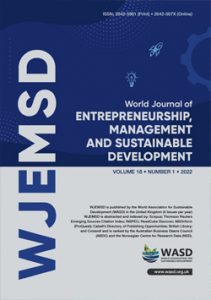Choice of processing techniques among rice processors in Nigeria, Omobolaji Obisesan, Kabir Salman, Kemisola Adenegan and Ghene Obi-Egbedi
 Omobolaji Olubukunmi Obisesan, Kabir Kayode Salman, Kemisola O. Adenegan, Ghene Oghenerueme Obi-Egbedi
Omobolaji Olubukunmi Obisesan, Kabir Kayode Salman, Kemisola O. Adenegan, Ghene Oghenerueme Obi-Egbedi
Department of Agricultural Economics, Faculty of Agriculture and Forestry
University of Ibadan, Ibadan
Nigeria
Email: omobolajironke@gmail.com
DOI: 10.1108/WJEMSD-07-2018-0060
Purpose: Rice processing, an important feature in rice production involving the transformation of harvested paddy into edible rice, is dependent on the type of rice processing techniques used. The purpose of this paper is to analyze the choice of processing techniques among rice processors in Nigeria.
Design/methodology/approach: The study was carried out in Nigeria using structured questionnaires among 410 rice processors selected from four states (Ebonyi, Ekiti, Ogun and Nasarawa) from three geo-political zones (Southeast, Southwest and North-central) of Nigeria. Information on socio-economic characteristics (age, sex, household size, marital status and education) and processing characteristics (experience, paddy source, processing activities, processing techniques, credit and distance) were obtained. Data were analyzed with the use of descriptive statistics and multinomial logistic regression model at 0.05.
Findings: The mean age of processors was 47.8±9.9 years, mean household size was 6.5±4.2 persons and 88.7 percent were married. In total, 73.6 percent had formal education and mean years of experience was 16.4±9.2 years. Main processing activities were parboiling and drying (50.0 percent); milling (40.0 percent); and de-stoning (10.0 percent). In all, 65.7, 20.4 and 13.9 percent used traditional and modern techniques (TMTs), traditional techniques (TTs) and purely modern techniques (PMTs), respectively. The probability of choice of TT relative to TMT reduced by years of education (4.5 percent), paddy source (1.8 percent) and distance to processing center (4.4 percent), while probability of choice of PMT relative to TMT increased for male processors (7.3 percent), membership of association(18.0 percent) and other income sources (6.2 percent).
Research limitations/implications: Level of education of processors and reduction in the distance taken to paddy source reduced choice of TTs.
Practical implications: Other income sources increased the choice of PMTs of rice processing in Nigeria.
Social implications: Processors with high level of education, who also engage in other income generating activities, were able to choose modern processing techniques.
Originality/value: This research was an original research carried out among rice processors in Nigeria.
Keywords: Access to credit; Distance to processing centre; Geo-political zones; Paddy source; Traditional and modern techniques.
Citation: Obisesan, O.O., Salman, K.K., Adenegan, K.O. and Obi-Egbedi, G.O. (2019), "Choice of processing techniques among rice processors in Nigeria", World Journal of Entrepreneurship, Management and Sustainable Development, Vol. 15 No. 1, pp. 70-83. https://doi.org/10.1108/WJEMSD-07-2018-0060

